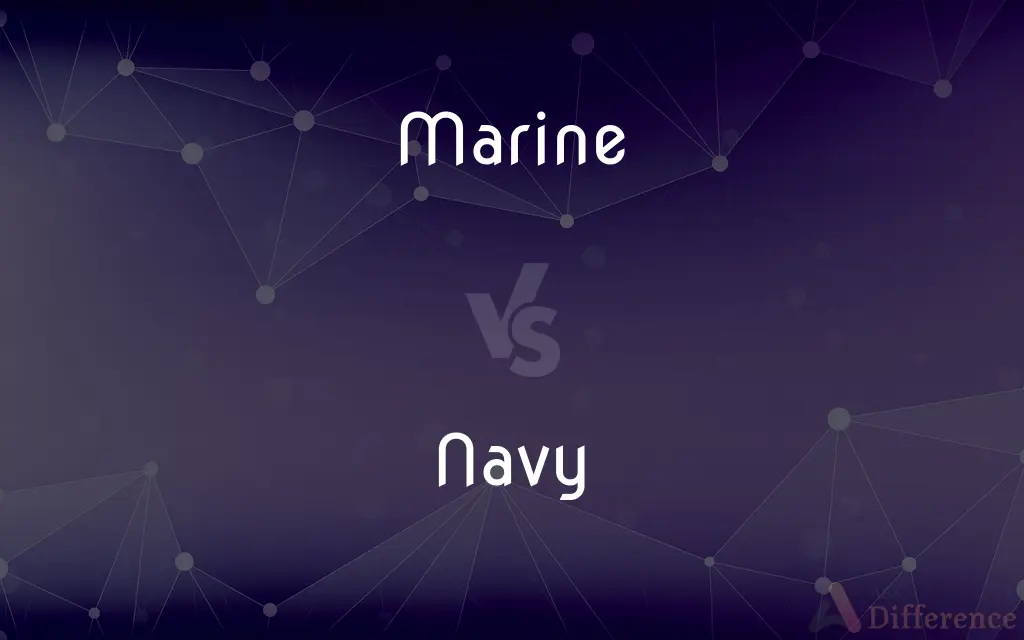Marine vs. Navy — What's the Difference?
Edited by Tayyaba Rehman — By Maham Liaqat — Updated on March 24, 2024
Marines operate as highly mobile amphibious assault forces, while navies focus on naval warfare, including sea control and power projection.

Difference Between Marine and Navy
Table of Contents
ADVERTISEMENT
Key Differences
Marines are specialized military forces trained for rapid deployment and operations, particularly in amphibious assaults where operations commence from the sea onto land. They are known for their versatility, ability to operate in various environments, and quick response capabilities. On the other hand, navies are the branch of a nation's armed forces principally designated for naval warfare, responsible for maintaining control of the seas, ensuring safe maritime passage, and conducting naval operations that include surface warfare, anti-submarine warfare, and aerial defense.
The primary role of marines often revolves around expeditionary warfare and ground combat, supporting naval campaigns and securing beachheads for further military operations inland. They are equipped and trained to perform in a variety of combat and non-combat roles, from direct assault to humanitarian assistance. Whereas navies, with their diverse assortment of vessels, including aircraft carriers, submarines, and destroyers, engage in battles on the sea, protect territorial waters, and ensure the strategic mobility of a country's military and economic assets across oceans.
Marines work closely with the navy to project military power, but their operations extend beyond the sea to significant actions on land. They are structured to be self-reliant, with their own air support to transport troops and provide close air support during operations. In contrast, the navy’s operations are predominantly at sea, focusing on controlling and dominating sea routes to influence global strategies, including blockades, sea-denial strategies, and the protection of merchant fleets.
Training for marines is intensely focused on amphibious combat readiness, emphasizing versatility and the ability to quickly adapt to new environments. This includes a combination of traditional infantry combat skills and specialized training for amphibious assaults. Navy personnel undergo a different set of training focused on maritime skills, ship operations, naval warfare tactics, and in some cases, underwater and submarine warfare, reflecting the broad scope of naval responsibilities.
The distinction between marines and navy is also historical and cultural, with each branch having its own traditions, ethos, and identity. Marines often pride themselves on being the "first to fight," reflecting their role in spearheading assaults and operating in forward positions. The navy, with its rich history of naval exploration, diplomacy, and combat, embodies the tradition of maritime excellence and the strategic control of the seas.
ADVERTISEMENT
Comparison Chart
Primary Role
Amphibious assaults and rapid deployment
Naval warfare and sea control
Operational Focus
Ground combat and support to naval operations
Surface, submarine, and aerial warfare
Training
Amphibious combat and versatility
Maritime skills and ship operations
Deployment
From sea to land operations
At sea and strategic maritime locations
Vessels/Assets
Transport vehicles and air support
Aircraft carriers, submarines, destroyers
Compare with Definitions
Marine
Military force specialized in amphibious warfare.
The marines landed on the beach at dawn.
Navy
Conducts maritime operations across the globe.
The navy participated in joint exercises with allied nations.
Marine
Capable of performing a wide range of military tasks.
Marines engage in everything from combat to humanitarian missions.
Navy
Maintains and operates warships and submarines.
The navy's fleet includes advanced aircraft carriers.
Marine
Known for being highly mobile and responsive.
The marine unit quickly responded to the crisis.
Navy
Engages in protecting the country's maritime interests.
The navy ensures safe passage for merchant ships.
Marine
Operate in support of naval campaigns.
The marines secured the port for naval operations.
Navy
Branch of armed forces responsible for naval warfare.
The navy patrolled the international waters.
Marine
Trained for rapid deployment and versatile operations.
Marines are often the first troops to enter conflict zones.
Navy
Specializes in sea control and power projection.
The navy’s presence deters potential maritime threats.
Marine
Relating to or found in the sea
Marine plants
Marine biology
Navy
A navy, naval force, or maritime force is the branch of a nation's armed forces principally designated for naval and amphibious warfare; namely, lake-borne, riverine, littoral, or ocean-borne combat operations and related functions. It includes anything conducted by surface ships, amphibious ships, submarines, and seaborne aviation, as well as ancillary support, communications, training, and other fields.
Marine
A member of a body of troops trained to serve on land or sea, in particular (in the UK) a member of the Royal Marines or (in the US) a member of the Marine Corps
A contingent of 2,000 marines
Navy
All of a nation's warships.
Marine
Of or relating to the sea
Marine exploration.
Navy
Often Navy A nation's entire military organization for sea warfare and defense, including vessels, personnel, and shore establishments.
Marine
Native to, inhabiting, or formed by the sea
Marine animals.
Navy
A group of ships; a fleet.
Marine
Relating to a system of oceanic habitats coextensive with the continental shelf, ranging from deep water to unprotected coastlines and characterized along its landward edge by exposure to wave action and tidal currents and by the absence of trees, shrubs, or emergent vegetation.
Navy
Navy blue.
Marine
Of or relating to shipping or maritime affairs.
Navy
(countable) A country's entire sea force, including ships and personnel.
People who get seasick easily shouldn't join the navy.
Marine
Of or relating to sea navigation; nautical
A marine chart.
Navy
(countable) A governmental department in charge of a country's sea force.
Marine
Of or relating to troops that serve at sea as well as on land, specifically the US Marine Corps.
Navy
A dark blue colour, usually called navy blue.
Marine
A soldier serving on a ship or at a naval installation.
Navy
(color) Having the dark blue colour of navy blue.
Marine
Often Marine A member of the US Marine Corps.
Navy
(military) Belonging to the navy; typical of the navy.
Marine
The mercantile or naval ships or shipping fleet of a country.
Navy
A fleet of ships; an assemblage of merchantmen, or so many as sail in company.
Marine
The governmental department in charge of naval affairs in some nations.
Navy
The whole of the war vessels belonging to a nation or ruler, considered collectively; as, the navy of Italy.
Marine
A painting or photograph of the sea.
Navy
The officers and men attached to the war vessels of a nation; as, he belongs to the navy.
Marine
Belonging to or characteristic of the sea; existing or found in the sea; formed or produced by the sea.
Navy
Same as navy blue.
Marine
Relating to or connected with the sea (in operation, scope, etc.), especially as pertains to shipping, a navy, or naval forces.
Navy
Having a color of navy blue.
Marine
Used or adapted for use at sea.
Navy
An organization of military naval forces
Marine
(zoology) Inhabiting the high seas; oceanic; pelagic. maritime or littoral}}
Navy
A dark shade of blue
Marine
(obsolete) Belonging to or situated at the seaside; maritime.
Marine
A soldier, normally a member of a marine corps, trained to serve on board or from a ship
He was a marine in World War II.
Marine
A marine corps.
He fought with the Marines in World War II.
Marine
A painting representing some marine subject.
Marine
To adapt for use in a marine environment.
Marine
To temporarily inundate with water and/or other marine substances.
Marine
To equip (a boat) with sailors and other personnel required for an ocean voyage.
Marine
Of or pertaining to the sea; having to do with the ocean, or with navigation or naval affairs; nautical; as, marine productions or bodies; marine shells; a marine engine.
Marine
Formed by the action of the currents or waves of the sea; as, marine deposits.
Marine
A solider serving on shipboard; a sea soldier; one of a body of troops trained to do duty in the navy.
Marine
A member of the United States Marine Corps, or a similar foreign military force.
Marine
The sum of naval affairs; naval economy; the department of navigation and sea forces; the collective shipping of a country; as, the mercantile marine.
Marine
A picture representing some marine subject.
Marine
A member of the United States Marine Corps
Marine
Of or relating to the sea;
Marine explorations
Marine
Relating to or involving ships or shipping or navigation or seamen;
Nautical charts
Maritime law
Marine insurance
Marine
Of or relating to military personnel who serve both on land and at sea (specifically the U.S. Marine Corps);
Marine barracks
Marine
Native to or inhabiting the sea;
Marine plants and animals such as seaweed and whales
Common Curiosities
What types of operations do navies conduct?
Navies conduct a variety of operations including naval warfare, anti-piracy, blockade enforcement, humanitarian assistance, and strategic deterrence.
How do the training requirements for marines and navy personnel differ?
Marines undergo rigorous combat and amphibious assault training, focusing on versatility and rapid deployment, while navy personnel receive training tailored to maritime skills, ship operations, and naval warfare tactics.
What role do navies play in international relations?
Navies play a crucial role in international relations by ensuring sea control, protecting maritime interests, conducting diplomatic missions, and participating in international maritime coalitions.
Can marines operate independently of the navy?
While marines can conduct independent operations, they are often deployed and supported by the navy, especially in amphibious assaults.
How do the roles of marines and navy intersect in joint operations?
In joint operations, marines typically handle ground combat and security tasks, while the navy provides sea control, logistical support, and air and missile defense, ensuring a coordinated effort in achieving operational objectives.
Are marines considered part of the navy?
In many countries, marines are a distinct branch of the armed forces but operate closely with the navy and often fall under the Department of the Navy.
How do navy ships support marine operations?
Navy ships transport marines, provide logistical support, and offer naval gunfire support and air cover to marine operations during amphibious assaults.
How do marines and navies contribute to national defense?
Marines provide rapid response capabilities and ground support for naval operations, while navies ensure the security of maritime borders, sea routes, and contribute to overall strategic military presence.
What distinguishes marines from the navy?
Marines specialize in amphibious assaults and operations from sea to land, while the navy focuses on warfare at sea, sea control, and power projection.
What equipment is unique to the marines?
Marines are equipped with amphibious assault vehicles, transport aircraft, and specialized gear for rapid deployment and operations on land and at sea.
What historical roles have marines played in military history?
Marines have historically been involved in key operations including amphibious assaults, securing strategic positions, and acting as a rapid response force in crisis situations.
Can navy personnel be stationed on land?
Yes, navy personnel can be stationed on land for various duties including training, administrative roles, and supporting naval operations from shore-based facilities.
Share Your Discovery

Previous Comparison
Differ vs. Contrast
Next Comparison
Juxtacrine vs. ParacrineAuthor Spotlight
Written by
Maham LiaqatEdited by
Tayyaba RehmanTayyaba Rehman is a distinguished writer, currently serving as a primary contributor to askdifference.com. As a researcher in semantics and etymology, Tayyaba's passion for the complexity of languages and their distinctions has found a perfect home on the platform. Tayyaba delves into the intricacies of language, distinguishing between commonly confused words and phrases, thereby providing clarity for readers worldwide.















































